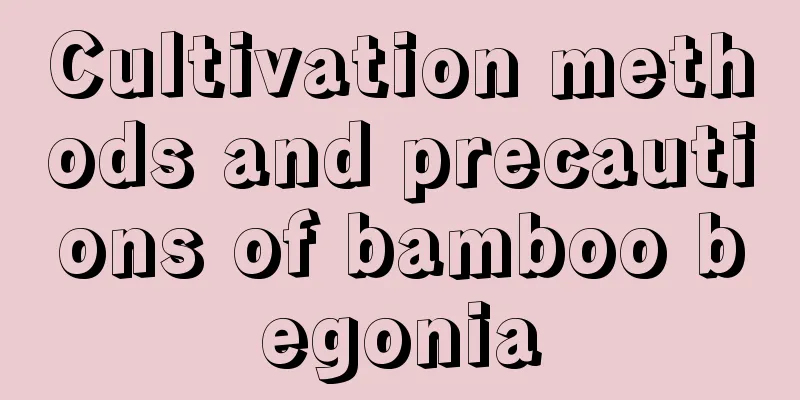Cultivation methods and precautions of bamboo begonia

Farming methodsLight and temperatureBamboo Begonia prefers a semi-shady growing environment and requires a mild climate. It is best to have sufficient diffuse light, but be careful not to have too strong light, otherwise it will cause the leaf tips to dry and turn yellow. In spring, autumn and winter, it can be given sufficient light, and in the summer when the sun is strong, it can be placed in a cool and ventilated place with bright scattered light. Be careful not to shade it too much, which will affect the growth of the plant. The best growth temperature is between 15℃ and 25℃. It is not cold-resistant and the temperature in winter should be kept above 10℃. > Watering and fertilizingBamboo Begonia likes a humid environment and can tolerate drought, but is afraid of waterlogging. Water it when the soil is dry and keep it moist. Be careful not to have water accumulation in the pot. When the weather is hot, water more often and spray water to increase air humidity and reduce temperatures. When applying fertilizer, be careful not to apply too much fertilizer. During the peak growth period, it is sufficient to apply a thin liquid fertilizer once every half a month. During the bud-forming period, some phosphorus and potassium fertilizers can be applied to make the flowers bloom beautifully. During the flowering period, it is necessary to reduce and stop fertilizing. In winter, when the growth slows down, fertilization should also be stopped. ReproductionThe main methods of reproduction of bamboo begonia are sowing and cuttings. Seed propagation can be done in spring or autumn, and cuttings propagation can be done by leaf cuttings, stem cuttings or rhizome cuttings. PrecautionspruneDuring the cultivation process, bamboo begonias need to be pruned in order to maintain a good shape and ensure the ornamental effect. Pruning can be combined with repotting, which is conducive to the sprouting of new branches and more flowering. Pests and diseasesCommon diseases of bamboo begonia include leaf spot, gray mold, root rot and wilt, which need to be treated according to the specific symptoms. The pests are mainly scale insects, which can be captured manually or killed by spraying pesticides. |
<<: Breeding methods and precautions of Jade
>>: Cultivation methods and precautions of Oxytricha
Recommend
What kind of soil is good for growing osmanthus? How to change the soil for potted osmanthus
1. What kind of soil is good for growing Osmanthu...
How to sow leek
Sowing time Allium orchid seedlings are more afra...
When is the best season to plant ginseng?
Ginseng is a common and precious medicinal materi...
Cultivation methods and precautions of umbrella grass
1. Maintenance methods 1. Soil: During its growth...
What flowers to grow in summer
Insect repellent Mint Mint has a special fragrant...
How to water the pearl spider plant
Watering tips for pearl spider plants Pearl spide...
How to make daffodils bloom during the Spring Festival
Accurate breeding time Most people will buy finis...
The flower language and meaning of Vanda orchid
1. Flower Language The flowers it blooms are beau...
How to propagate dianthus and what to pay attention to
How to reproduce dianthus There are three common ...
How to make hibiscus bloom more and how to care for it during the flowering period
1. How to make more flowers 1. Choose a good pot ...
How to grow Areca palm so that it will bloom out of the pot?
Areca palm , also known as yellow coconut, is a c...
What to do if the leaves of Spathiphyllum are short
1. Supplement sunlight Reason: Generally, the lea...
What are the breeding methods and precautions of Tiger Skin Ornament?
How to breed tiger skin arrow The wormwood is a p...
Where are the conditions and climate suitable for growing Angelica?
Angelica planting conditions Angelica prefers a c...
How to fertilize gerbera
1. Frequency and timing of fertilization Gerbera ...









